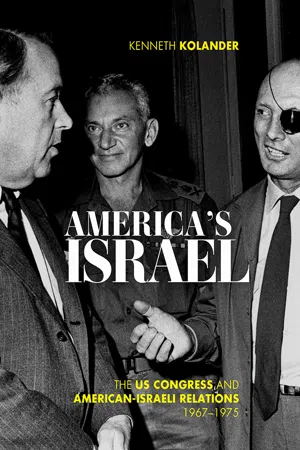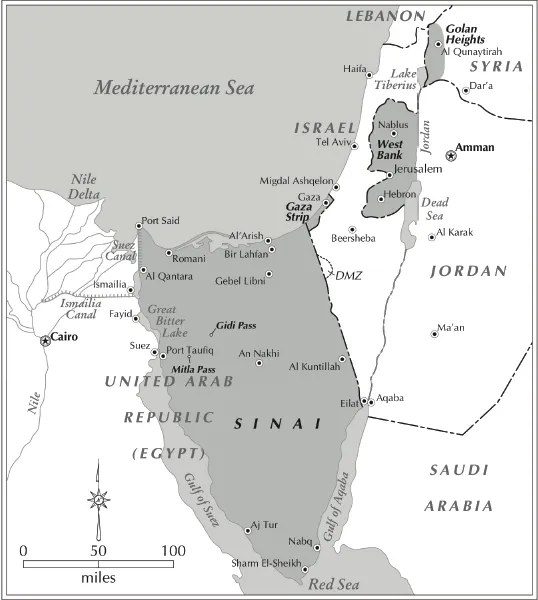![]()
1
Johnson, Congress, and the Special Relationship
An American Commitment to the Survival of Israel
An American commitment to the survival of Israel became evident before and during the Six-Day War in June 1967. For the first time after the Holocaust, Jews in Israel felt genuinely afraid of being overrun.1 Arab leaders, particularly Egyptian President Gamal Abdel Nasser, refused to recognize Israel and continually threatened to destroy it or to drive it into the sea. Nasser aimed to generate popular support through bombastic rhetoric and likely did not really believe Egypt—or any collection of Arab forces—could, or would, destroy Israel. But threats to exterminate Israel could not be ignored. Israel also contributed to the rising tensions in the region with its attack on Samu, a Jordanian village, in November 1966, and needless provocations with Syria, which led to an air battle in April 1967.
While the threats against Israel added to Nasser’s popular appeal in the Arab world, they encouraged American support for Israel just as much. As events moved toward war, U.S. legislators took to the House and Senate floors and collectively declared an uncompromising commitment to protecting Israel. After the war, the United States supported Israel’s decision to remain in the occupied territories (Sinai Peninsula, Gaza Strip, West Bank, Golan Heights, and East Jerusalem) until Arab states agreed to make peace with Israel. That decision, which would guide U.S. policy for decades to follow, was originally rooted in an American commitment to securing the safety of Israel.
Map: After the Six-Day War, Israel occupied the West Bank, Gaza, Golan Heights, Sinai Peninsula, and East Jerusalem. The Johnson administration initiated land-for-peace diplomacy, whereby Israel would give back Arab lands in return for peace agreements.
Lyndon Johnson felt a strong affection for the State of Israel, but like the presidents before him, he aimed to pursue an evenhanded policy in the Middle East. He often refused Israeli requests for weapons in order to stave off an arms race with the Soviet Union. Unable to prevent an arms race, Johnson tried to avoid selling weapons disproportionally in the region, to support American claims to evenhandedness. Despite his efforts, Johnson became the first U.S. president to sell offensive weapons to Israel. Nevertheless, Johnson’s decisions should be considered within the context of a desire to balance weapons sales between Israel and moderate Arab states and to limit such sales altogether. As Zach Levey has argued, Johnson wanted to avoid entering into a strategic relationship with Israel.2 Israel, for its part, wanted to expand a special relationship into a strategic alliance built on military aid. Walter Hixson has ably demonstrated that the Israel lobby played an important role in pressuring Johnson into adopting a decidedly pro-Israel position.3
The U.S. Congress emerged as a vocal branch of dissent to Johnson’s foreign policy with Israel and, in particular, to his reluctance to sell weapons to Israel. Legislators forced Johnson to publicly contend with the issue of weapons sales to Israel by using legislation (binding and nonbinding), letters, speeches, and official statements to criticize the president’s unwillingness to better arm Israel. These efforts laid a foundation for an ongoing critique of presidential foreign policy in the region that contributed to a dramatic increase of weapons sales. Congress legitimized dissent of presidential foreign policymaking in both East Asia and the Middle East during Johnson’s presidency and in that way affected presidential decision-making in both regions.
Several scholars have analyzed U.S.-Israel relations during Johnson’s presidency; however, no work situates U.S.-Israel relations within the context of increased congressional activity in foreign policy during the LBJ years in order to explore how a Vietnam War–era Congress impacted the U.S.-Israel special relationship.4 This chapter attempts to fill that void.
U.S. Weapons Sales to Israel prior to the 1967 War
The persistent instability in the Middle East, which stemmed in part from the ongoing Arab-Israeli conflict, worsened during Lyndon Johnson’s presidency and brought about more U.S. involvement in the region. The 1948–1949 Arab-Israeli War was a War for Independence for Jews, who administered the newly declared State of Israel, but a catastrophe (nakba) for the stateless Palestinian Arabs, who did not receive the allotment of land designated by the U.N. General Assembly in November 1947. Approximately 700,000 Arabs either fled or were forced from their homes during the 1948–1949 war, which started the Palestinian refugee crisis. Border conflicts persisted throughout the 1950s, and conditions grew worse during the 1960s. Tensions arose between Syria and Israel over water rights to the headwaters of the Jordan River, with escalations in 1964 and 1965.5 The Palestine Liberation Organization (PLO), created in 1964, declared its central goal to be the destruction of the State of Israel. Yasser Arafat, the leader of Fatah (the largest and most important member organization of the PLO), continued his instigation of terrorist attacks against Israel.6 The PLO found more support for a war against Israel after a Syrian revolution brought the Baathist Party to power in 1966, supported by the Soviet Union. Many PLO attacks against Israel came from Syrian territory, with vocal Soviet encouragement for the Arab “progressive revolutionary” front.7 Terrorist attacks against Israel spiked in 1966 and 1967, and Israel often responded with disproportional force, which created hostile conditions that contributed to the outbreak of war in June 1967.
The Middle East did not figure prominently in Johnson’s foreign policy. He was a known “friend of Israel” from his days in the Congress, but the Vietnam War, beyond all other matters, dominated Johnson’s presidency. The former Senate majority leader from Texas preferred to focus on domestic issues, and particularly the Great Society, a New Deal–inspired program that aimed to eliminate poverty and promote civil rights. But advancements on the domestic front were undercut by the worsening war in East Asia. To make matters worse, the combination of a costly war with an overly ambitious domestic reform project, along with the end of the postwar boom in the United States and a consistent unwillingness to raise taxes, altogether created an economic malaise. Economic problems were compounded by social divisiveness, as the Civil Rights Movement and anti-war protests divided the nation. The beleaguered Johnson was so embattled he did not even run for reelection in 1968. After a poor showing in the New Hampshire primary in March 1968 (which he actually won), Johnson withdrew his candidacy.
Like many Americans, LBJ felt a cultural affinity for the people of Israel.8 He told a B’nai B’rith meeting in 1968, “Most, if not all of you, have very deep ties with the land and with the people of Israel, as I do, for my Christian faith sprang from yours.”9 While he regarded Israelis as tough pioneers, he regarded Arabs as “culturally different” with experiences “alien to his own.”10 As Spiegel notes, “Johnson tended to see the Israelis fighting the Arabs as a modern-day version of the Texans struggling with the Mexicans. The analogy between the Alamo and Masada was not far below the surface.”11 Cultural factors certainly undergirded Johnson’s perspective; however, as president—entrusted with executing the foreign relations of the United States—the Cold War and domestic politics weighed much more heavily on his thinking regarding weapons sales to Israel.
As more and more Soviet weaponry made its way to client states in the region, Israel requested weaponry from the United States. According to Levey, between 1955 and 1965, the Soviet Union sold Egypt, Syria, Iraq, and the People’s Democratic Republic of Yemen approximately $2 billion worth of weaponry. Egypt was the main recipient. By the beginning of 1965, Egypt had 300 combat planes, including MiG jet interceptors and Tupelov bombers; by comparison, Israel had 250 warplanes, but no bombers. In terms of tanks, Egypt enjoyed a qualitative advantage over Israel. At the beginning of 1964, Israel had 798 tanks, compared with Egypt’s 739, but 300 of Israel’s tanks were obsolete M-4 Shermans, and only 150 British-made Centurions were of relatively recent manufacture.12
The United States preferred that Israel purchase its weapons from Western Europe. France had served as Israel’s primary weapons supplier. Like Israel, France resented Nasser’s influence in the region. But the Israel-France relationship cooled after the French exit from Algeria, and Western Europe proved reluctant to provide Israel with more weapons.13
U.S. weapons sales to Israel had grown from virtually nonexistent in the 1950s to several select packages in the 1960s. During 1962, John Kennedy authorized the first sale of U.S. weaponry to Israel—the defensive HAWK antiaircraft missile systems. But Kennedy refused to sell offensive weapons, in part because of Israel’s controversial nuclear weapons program, and also to limit American involvement in the Arab-Israeli conflict. In early 1964, Israel requested to purchase five hundred tanks from the United States to offset Soviet tanks sold to Egypt. Both the State Department and the Defense Department recognized the validity of Israel’s arms request but also warned of the political cost to U.S. relations with Arab states. Johnson agreed with the assessment and offered to help Israel “behind the scenes” to find alternate sources. Soon thereafter, Israel quietly signed agreements with Britain and West Germany for tank purchases.14
In the summer of 1964, the Kingdom of Jordan informed U.S. policymakers that unless it could purchase fighter jets from the United States, Jordan would buy MiG fighters from the Soviet Union. Naturally, Johnson did not want Jordan to develop closer relations with Moscow. And while he wanted to bolster King Hussein’s government, he did not want to furnish Jordan with weapons that could potentially be used against Israel. Hixson details how the Israel lobby worked hard to scuttle the deal, and then decided to support it so long as Israel could acquire more sophisticated weaponry from the United States.15 Thus, the arms race would accelerate because Israel would undoubtedly demand a similar deal, and Soviet client states would demand more weapons, too. Johnson promised to sell Jordan twenty F-104 jets in February 1965.
The promise of more U.S. weapons to Jordan amplified Israel’s request for weapons. To make matters worse, West Germany decided to abandon its agreement with Israel after delivering less than half of the number of promised tanks.16 Still reluctant to sell weapons to Israel directly, Johnson sent National Security Council staffer Robert Komer and Undersecretary of State for Political Affairs W. Averell Harriman to Israel to stress that the Jordanian package was simply to prevent a similar deal with the Soviets, and that Israel should expect no weapons sales from the United States. But the Harriman-Komer mission failed to get Israel on board with a U.S.-Jordan weapons agreement without, at least, a similar agreement with Israel.17
Cold War politics made an arms race in the Middle East unavoidable, which positioned the United States closer to Israel. To pacify the Israelis, Johnson agreed to sell the tanks promised from West Germany, which marked the first time that a U.S. president agreed to sell offensive weapons to the State of Israel. However, Israeli officials balked at this proposal, too, for being insufficient. Johnson then agreed to supply Israel with arms comparable to those it sold to Jordan, but with an understanding that it was a one-time deal; in other words, Johnson emphasized that such a sale would not set a precedent.18 Although Israeli officials continued t...

